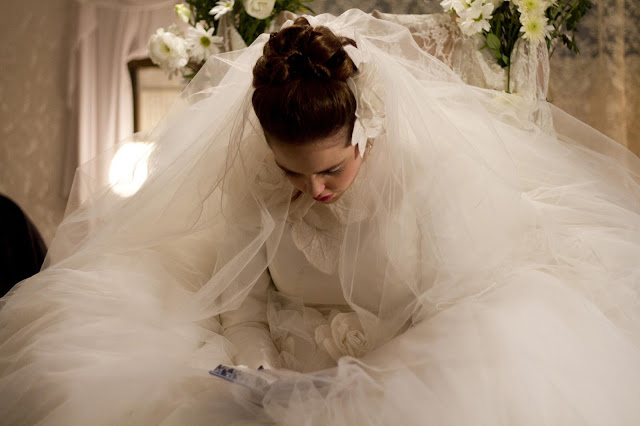Berberian Sound Studio (2012)
dir. Peter Strickland **1/2
Starring: Toby Jones
Review By Greg Klymkiw
Sound has been with movies almost from the beginning. Long before Al Jolson uttered the immortal words "You ain't heard nothin' yet" in 1927's The Jazz Singer, filmmakers experimented with having original scores composed for their films and even designing live foley and sound effects - all of which were achieved by full orchestras for some of the bigger releases in more established picture palaces. Once the "talkies" came, though, a whole new art and craft began to develop - not just synch sound recordists on set, but all the magicians in the sound studios who created effects, mixed and tweaked the sound and edited the sound.
In this day and age, sound has become, for better or worse (and depending on the film), the primary instigation for how, why, where and when to actually make picture cuts in genre pictures. Sadly, far too many contemporary directors that have absolutely no eye for creating decent action or suspense sequences, rely solely on sound to make up for their lack of talent. Or rather, they think they know precisely what they're doing and have their butts saved by editors as well as the low standards of audiences all afflicted with ADD.
One dreadful (and idiotically overrated) director after another (Christopher Nolan and JJ Abrams to name two especially egregious members of this ever-expanding club of dimwits), piece together a wide variety of badly composed, poorly conceived and mostly close shots, throw them into the post-production blender where picture editors must save the miserable footage by using sound as the driving force behind their cuts rather than propelling the image forward to hit dramatic beats. The moron directors think it's all about pace and creating suspense from cacophony when in actual fact, this style of shooting and cutting exhausts an audience to a point where watching the film has less to do with being able to follow a story as it is to be whacked repeatedly in the face.
We're bludgeoned and pummelled senselessly by sound and a whole whack of great artists and craftspeople in this field are turned into volume (of the amount AND level of audio variety) generators.
While, there are a number of great movies about movies, the only one that brilliantly and perfectly captures the art of sound men is still Brian DePalma's seminal thriller Blow Out which starred John Travolta as a movie sound recordist who tries to solve a mystery using the location sound he's recorded. (The Conversation counts as a great "sound" picture, but its focus is surveillance rather than the movies.)
Berberian Sound Studio could have been the best movie about sound in movies since DePalma's mournful thriller, but finally, it achieves that for about 30 of its 92 minutes until it starts spinning its wheels and diving into bargain basement Lynch-like surrealism and sledge hammer (albeit somewhat disingenuous) commentary on the effects of screen violence.
But, first, let's concentrate on the good.
Set during the heyday of Italian horror/suspense thrillers of the 70s, the picture tells the tale of Gilderoy (Toby Jones), a pathologically introspective sound man (which, ultimately, all great sound guys must be). He's as twee and British as Queen Elizabeth (but not quite as inbred) and he's taken a job presiding over the aural arts being applied in post-production to the latest blood-spattered giallo epic by Santini (Antonio Mancino), the reigning maestro of spaghetti horror.
At first, the film is a loving homage to the magnificent giallo genre and a great fish out of water tale. As Gilderoy works his sound magic on this ultra-violent and decidedly misogynistic gore-fest, things slowly and creepily build (not unlike the best Polanski) to a point where dream, reality and nightmare collide and eventually cross a line where we're experiencing a potential mental breakdown.
Alas, once the picture crosses over into this territory, tedium starts to set in. It's too bad. Toby Jones delivers a crackling good performance, whilst the production design and cinematography go above and beyond the call of duty in creating an atmosphere that seems like it was ripped out of the single greatest movie decade in the history of movies. But, as sure as Dario Argento is Italian, Gilderoy's mind starts to crack under the weight of the long hours, a xenophobic attitude (on both sides of the equation) and image after image of the most brutal violence against women.
What's a bit disappointing is that this is our expectation almost from the beginning and our hope, because the first half hour IS so cool and atmospheric (and a movie geek's wet dream), is that it will not veer into familiar territory. As such, the movie feels like a short film idea stretched out interminably over 90 minutes.
It was fun, however, being in a sound studio that bore all the familiar traces of what it was like to work with real film, mag stock and optical. No digital allowed, thanks! Weirdly, though, the most disappointing aspect next to the by-the-numbers surrealism is the fact that the movie SOUNDS like most movies today.
Oh, how I wish it all sounded like a great centre-speaker mono mix with that gentle hiss that can only emanate from optical and analog sound. If Berberian Sound Studio truly had the courage of its convictions - it should have adhered to every element of the period.
A good script might have worked wonders, also.
"Berberian Sound Studio" originally played during the Toronto International Film Festival's 2012 edition of the Vanguard series. It is currently in theatrical release via FilmsWeLike. In Toronto, it is playing at the TIFF Bell Lightbox.




























